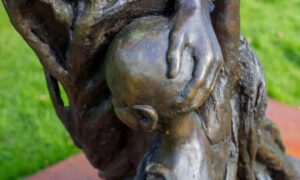
For more than five long decades me, my children and the hundreds of other families affected by sexual assault and rape during the Vietnam war have faced interminable suffering. It has been an impossible battle against shame and stigma, a struggle for jobs, services and survival, and a fight for rightful recognition from our government and our communities.
I am a mother to three Lai Dai Han – a derogatory term that means “mixed blood” in Vietnamese – children born as a result of rape committed by South Korean soldiers during the war. These children are regarded in Vietnam as rubbish, denied access to education and basic social services, hindering their ability to get a job and earn a living. Many of the Lai Dai Han have been forced to conceal their identities.
Across the world, there are many groups of survivors, such as mine, whose lives and futures have been completely dismantled by sexual violence. It is deeply shocking that sexual violence continues to play a part of every modern-day conflict and war zone around the world. We relive our pain every time we hear of new reports of these crimes in Palestine and Israel, Sudan, Ukraine and so many other places.
We can take some comfort knowing that modern survivors are now starting to receive reparations they so desperately deserve. The recent decision for Ukrainian survivors to be paid reparations sends a strong message that sexual violence will not be tolerated and that survivors’ needs will be recognised and upheld.
But my survivor community has yet to receive any recognition – let alone any kind of compensation – for what we and our children have endured. Like so many other historic survivor groups, we are running out of time.
I was 24 when I was first assaulted by a South Korean officer. When I discovered I was pregnant, I was beaten by my parents and attempted to end my life several times, but survived – I feel as though my unborn child was fighting for us both. Four years later, the same officer appeared again, taking me and my daughter to his remote military base. Ashamed and isolated, I felt I had no choice but to spend the next two years with my rapist, living in constant fear for my life and that of my child.
I had another baby with him before being abandoned when he moved to another base. I found my way back to my parents and continued to work hard to feed my children. There, I was raped by a South Korean military policeman and became pregnant with my third child.
The Lai Dai Han have carried the weight of a war-torn past, grappling with the scars inherited from their mothers and the prejudice from a society that does not accept their legitimacy.
